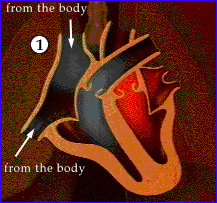


This update of the 1991 Framingham coronary prediction algorithm provides estimates of total CHD risk (risk of developing one of the following: angina pectoris, myocardial infarction, or coronary disease death) over the course of 10 years. Separate score sheets are used for men and women and the factors used to estimate risk include age, blood cholesterol (or LDL cholesterol), HDL cholesterol, blood pressure, cigarette smoking, and diabetes mellitus. Relative risk for CHD is estimated by comparison to low risk Framingham participants.
In addition to score sheets for men and women, a sample score sheet is provided to illustrate how they can be used.
Users of this risk algorithm should be aware of several caveats:
Limitations — Risk assessments
that stratify patients according to the number of defined risk factors can
identify high-risk persons, but they tend to falsely reassure persons deemed
to be at low risk who may have multiple marginal abnormalities. Since the
segment of the population with borderline abnormalities of blood pressure
and lipids has most of the coronary events, it is important not to overlook
these subjects.

As an illustration for using the score sheets, consider a 55 year old man with a total cholesterol of 250 mg/dL, HDL cholesterol of 39 mg/dL, blood pressure of 146/88, diabetic and a non-smoker.
Use the Total Cholesterol Score Sheet when total cholesterol and HDL cholesterol are available. Use the LDL Cholesterol Score Sheet when LDL cholesterol and HDL cholesterol are available.
| Step |
Factor |
Points |
| 1 |
Age = 55 years | 4 |
| 2 |
*Total cholesterol = 250 mg/dL | 2 |
| 3 |
HDL cholesterol = 39 mg/dL | 1 |
| 4 |
Blood pressure = 146/88 mm Hg | 2 |
| 5 |
Diabetic = yes | 2 |
| 6 |
Cigarette smoker = no | 0 |
| 7 |
Point Total | 11 |
| 8 |
Estimated 10 Year CHD Risk | 31% |
| 9 |
Low 10 Year CHD Risk | 7% |
| Relative Risk (step 8 divided by step 9) | 31/7 = 4.4 |
|
| *Use of the LDL cholesterol approach in the scoresheets is appropriate when fasting LDL cholesterol estimates are available. The approach is analogous to that shown for total cholesterol categories. | ||


Dividing the subject's risk by the low risk provides an estimate of the relative risk, where 31% divided by 7% = 4.4, meaning that coronary risk for this individual is approximately 4 times that of a man the same age with a low risk profile.
The average and low risk of CHD over 10 years for a 55 year old man are 16% and 7% respectively . The average risk was derived from the experience of Framingham men and women, using their average risk factor levels to provide the estimates. The low risk was calculated using the following factors: